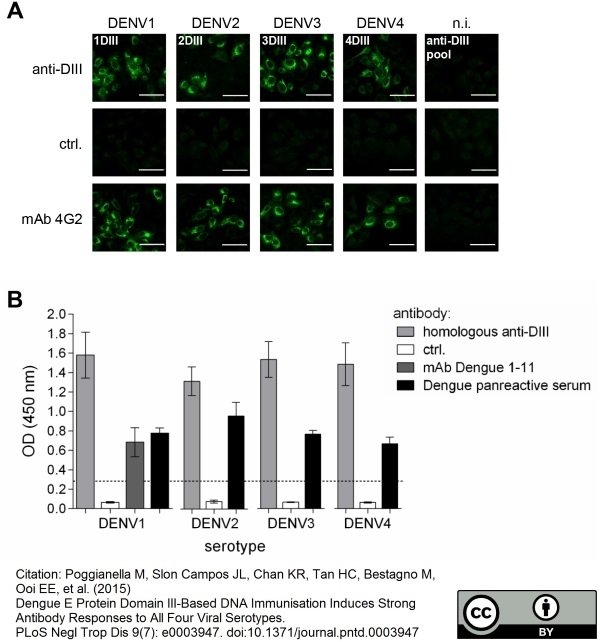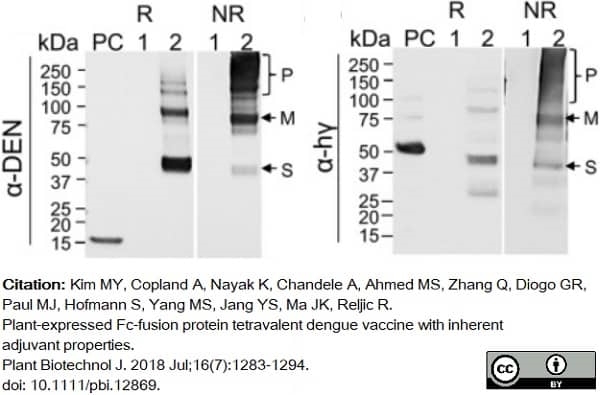Dengue Virus antibody | Dengue 1-11(3)


Mouse anti Dengue Virus
- Product Type
- Monoclonal Antibody
- Clone
- Dengue 1-11(3)
- Isotype
- IgG2a
- Specificity
- Dengue Virus
| Mouse anti-Dengue virus antibody, clone Dengue 1-11 (3) recognizes all four dengue virus serotypes (DEN-1, DEN-2, DEN-3 and DEN-4) of the genus Flavivirus. Mouse anti-Dengue virus antibody, clone Dengue 1-11 (3) binds strongly to subtypes 1 and 2. It recognizes subtype 3 more weakly. Among the four subtypes, subtype 4 is recognized the least strongly and some customers have reported no recognition of subtype 4. The dengue virus is responsible for the tropical and sub-tropical diseases, dengue (DF) and dengue haemorrhagic fever (DHF), transmitted to individuals through the bite of the Aedes mosquito. The global distribution of dengue is expanding and comparable to that of malaria, with symptoms ranging from a mild viral syndrome of high fever, rash, headache, fatigue and muscle and joint pain, to the more severe and sometimes fatal DHF. Each dengue virus serotype is antigenically distinct, such that infection only provides an individual with immunity to the causative serotype, with the possibility of further infection by a different serotype or even multiple serotypes. |
- Target Species
- Viral
- Product Form
- Purified IgG - liquid
- Preparation
- Purified IgG prepared by affinity chromatography on Protein A from tissue culture supernatant
- Buffer Solution
- Phosphate buffered saline
- Preservative Stabilisers
- <0.1% sodium azide (NaN3)
- Approx. Protein Concentrations
- IgG concentration 1.0mg/ml
- Regulatory
- For research purposes only
- Guarantee
- 12 months from date of despatch
Avoid repeated freezing and thawing as this may denature the antibody. Storage in frost-free freezers is not recommended.
| Application Name | Verified | Min Dilution | Max Dilution |
|---|---|---|---|
| ELISA | |||
| Immunofluorescence | |||
| Immunohistology - Paraffin 1 | |||
| Western Blotting |
- 1This product requires antigen retrieval using heat treatment prior to staining of paraffin sections.Sodium citrate buffer pH 6.0 is recommended for this purpose.
- Western Blotting
- This antibody detects an anti-E/envelope specific band of ~61 kDa under reducing conditions. A weak secondary band of ~80 kDa may also be apparent.
References for Dengue Virus antibody
-
Kim,T.G. et al. (2010) Cholera toxin B subunit-domain III of dengue virus envelope glycoprotein E fusion protein production in transgenic plants.
Protein Expr Purif. 74:236-41. -
Nguyen, N.L. et al. (2015) Expression and characterization of an M cell-specific ligand-fused dengue virus tetravalent epitope using Saccharomyces cerevisiae.
J Biosci Bioeng. 119 (1): 19-27. -
Poggianella, M. et al. (2015) Dengue E Protein Domain III-Based DNA Immunisation Induces Strong Antibody Responses to All Four Viral Serotypes.
PLoS Negl Trop Dis. 9 (7): e0003947. -
Milic, N.L. et el. (2015) Sequence analysis and characterisation of virally induced viperin in the saltwater crocodile (Crocodylus porosus).
Dev Comp Immunol. 51 (1): 108-15. -
Slon Campos, J.L. (2017) Evaluation of a Tetravalent DNA Vaccine against Dengue: Integrating Biochemical Studies on Dengue Virus Envelope Protein to a Domain-Based Antigen Design.
PhD thesis The Open University. -
Kim, M.Y. et al. (2018) Plant-expressed Fc-fusion protein tetravalent dengue vaccine with inherent adjuvant properties.
Plant Biotechnol J. 16 (7): 1283-94. -
Kim, B. & Kim, M. (2019) Evaluation of the oral immunogenicity of M cell-targeted tetravalent EDIII antigen for development of plant-based edible vaccine against dengue infection
Plant Cell, Tissue and Organ Culture (PCTOC). 137 (1): 1-10. -
Kim, M.Y. et al. (2024) Marked enhancement of the immunogenicity of plant-expressed IgG-Fc fusion proteins by inclusion of cholera toxin non-toxic B subunit within the single polypeptide.
Plant Biotechnol J. Jan 01 [Epub ahead of print].
View The Latest Product References
Further Reading
-
Gubler, D.J. (1998) Dengue and dengue hemorrhagic fever.
Clin Microbiol Rev. 11 (3): 480-96. -
Loroño-pino, M.A. et al. (1999) Common occurrence of concurrent infections by multiple dengue virus serotypes.
Am J Trop Med Hyg. 61 (5): 725-30. -
PhilipSamuel, P. & Tyagi, B.K. (2006) Diagnostic methods for detection & isolation of dengue viruses from vector mosquitoes.
Indian J Med Res. 123 (5): 615-28.
- RRID
- AB_609623
Please Note: All Products are "FOR RESEARCH PURPOSES ONLY"
View all Anti-Viral ProductsAlways be the first to know.
When we launch new products and resources to help you achieve more in the lab.
Yes, sign me up
